British Empire
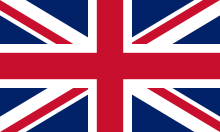

The British Empire was composed of the dominions, colonies, protectorates, mandates, and other territories ruled or administered by the United Kingdom and its predecessor states. It began with the overseas possessions and trading posts established by England between the late 16th and early 18th centuries. At its height it was the largest empire in history and, for over a century, was the foremost global power. By 1913 the British Empire held sway over 412 million people, 23 per cent of the world population at the time, and by 1920 it covered 35,500,000 km2 (13,700,000 sq mi), 24 percent of the Earth's total land area. As a result, its constitutional, legal, linguistic, and cultural legacy is widespread. At the peak of its power, it was described as "the empire on which the sun never sets", as the sun was always shining on at least one of its territories.
Quotes
[edit]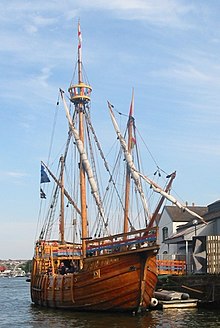
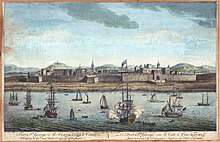


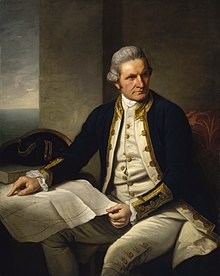
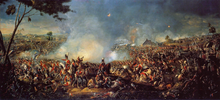


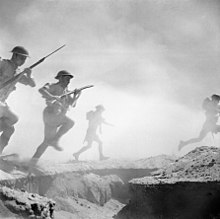
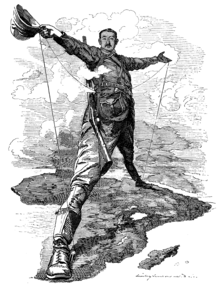

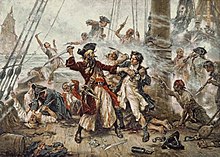
18th century
[edit]1740s
[edit]- To thee belongs the rural reign;
Thy cities shall with commerce shine:
All thine shall be the subject main,
And every shore it circles thine.
Rule, Britannia, rule the waves;
Britons never will be slaves.- James Thomson, "Rule, Britannia!", st. 5, in Alfred, a Masque (1740), act 2
1770s
[edit]- In this vast empire, on which the sun never sets, and whose bounds nature has not yet ascertained, one great superintending and controuling dominion must exist somewhere; and where can that dominion reside with so much dignity, propriety, and safety, as in the British legislature?
- Sir George Macartney, An Account of Ireland in 1773 by a late Chief Secretary of that Kingdom (London, 1773), p. 55
- "If then, we are a part of the British empire, we must be subject to the supreme power of the state, which is vested in the estates of parliament." Here again, we are to be conjured out of our senses by the magic in the words "British empire" and "supreme power of the state." But, however it may sound, I say we are not a part of the British empire, because the British government is not an empire. The governments of France, Spain, &c. are not empires, but monarchies, supposed to be governed by fixed fundamental laws, though not really. The British government is still less entitled to the style of an empire. It is a limited monarchy. If Aristotle, Livy, and Harrington knew what a republic was, the British constitution is much more like a republic than an empire. They defined a republic to be a government of laws, and not of men. If this definition is just, the British constitution is nothing more nor less than a republic, in which the king is first magistrate. This office being hereditary, and being possessed of such ample and splendid prerogatives, is no objection to the government's being a republic, as long as it is bound by fixed laws, which the people have a voice in making, and a right to defend. An empire is a despotism, and an emperor a despot, bound by no law or limitation but his own will; it is a stretch of tyranny beyond absolute monarchy. For, although the will of an absolute monarch is law, it must be registered by parliaments. Even this formality is not necessary in empire.
- John Adams, Novangulus (6 February 1775)
19th century
[edit]1870s
[edit]- It has been said that the people of this country are deeply interested in the humanitarian and philanthropic considerations involved in [the Eastern Question]. All must appreciate such feelings. But I am mistaken if there be not a yet deeper sentiment on the part of the people of this country, one with which I cannot doubt your lordships will ever sympathise, and that is—the determination to maintain the Empire of England.
- Benjamin Disraeli, speech in the House of Lords (20 February 1877), quoted in William Flavelle Monypenny and George Earle Buckle, The Life of Benjamin Disraeli, Earl of Beaconsfield. Volume II. 1860–1881 (1929), p. 994
- [I]f our ancestors had cared for the rights of other people, the British empire would not have been made.
- Lord Salisbury's remarks to the Cabinet (8 March 1878), quoted in John Vincent (ed.), The Diaries of Edward Henry Stanley, Fifteenth Earl of Derby (1994), p. 523
- We are trustees for the British Empire. We have received that trust with all its strength, all its glory, all its traditions; and the one thing we have to care for is that we pass them untarnished to our successors.
- Lord Salisbury, speech in the House of Lords (8 April 1878)
1880s
[edit]- For southern wind and east wind meet
Where, girt and crowned by sword and fire,
England with bare and bloody feet
Climbs the steep road of wide empire.- Oscar Wilde, "Ave Imperatrix", in Poems (Boston, MA: Roberts Bros., 1881), p. 5
- In our belief, the great empire of England, which we have inherited from our forefathers, concerns all alike, but it concerns those most who depend most for trade and employment upon the constant prosperity of the country. (Cheers.) I do not believe that England, stripped of India, stripped of its colonies, humbled before Europe, would be a happy England for the working classes. (Cheers.) We have received from the self-denial, the heroic actions of our forefathers a great empire. We mean, if we can, to keep it (cheers), to develop it, to strengthen it, to enrich it, and that not in the interests of a class, but of all, and most of all the industrial classes of this country. (Loud and prolonged cheers.)
- Lord Salisbury, speech in Birmingham (29 March 1883), quoted in The Times (30 March 1883), p. 10
- I hope we may be able sooner or later to federate, to bring together, all these great dependencies of the British Empire into one supreme and Imperial Parliament (cheers), so that they should be all units of one body, that one should feel what the others feel, that all should be equally responsible, that all should have a share in the welfare and sympathize with the welfare of every part. That is what I hope, but there is very little hope for it if you weaken the ties which now bind the central portion of the Empire together. (Cheers.)
- Joseph Chamberlain, speech in Rawtenstall (8 July 1886), quoted in The Times (9 July 1886), p. 6
- The business which brings you here to-day is of a peculiar character, due to the very peculiar character of the Empire over which the Queen rules. It yields to none, it is perhaps superior to all in its greatness, in its extent, in the vastness of its population, in the magnificence of its wealth. But it has this peculiarity which separates it from other empires—the want of continuity. The Empire is separated into parts, and distant parts, by large stretches of ocean, and what we are really here to do is to see how far we must acquiesce in the conditions which that separation causes, how far we can obliterate them by agreement and by organization.
- Lord Salisbury, speech to the Colonial Conference in London (4 April 1887), quoted in The Times (5 April 1887), p. 11
1890s
[edit]- [The British Empire is] the greatest secular agency for good now known to mankind.
- Lord Rosebery, speech at the unveiling of a bust of the late Canadian Prime Minister Sir John Macdonald at Westminster Abbey (16 November 1892), quoted in The Times (17 November 1892), p. 9
- She stands, a thousand-wintered tree,
By countless morns impearled;
Her broad roots coil beneath the sea,
Her branches sweep the world;
Her seeds, by careless winds conveyed,
Clothe the remotest strand
With forests from her scatterings made,
New nations fostered in her shade,
And linking land with land. - O ye by wandering tempest sown
’Neath every alien star,
Forget not whence the breath was blown
That wafted you afar!
For ye are still her ancient seed
On younger soil let fall—
Children of Britain’s island-breed,
To whom the Mother in her need
Perchance may one day call.- Sir William Watson, "England and Her Colonies", in Poems (1893)
- I venture to claim two qualifications for the great office which I hold, which to my mind, without making invidious distinctions, is one of the most important that can be held by any Englishman; and those qualifications are that in the first place I believe in the British Empire, and in the second place I believe in the British race. I believe that the British race is the greatest of the governing races that the world has ever seen.
- Joseph Chamberlain, speech to the Imperial Institute (11 November 1895), quoted in The Times (12 November 1895), p. 6
- God of our fathers, known of old—
Lord of our far-flung battle-line—
Beneath whose awful Hand we hold
Dominion over palm and pine—
Lord God of Hosts, be with us yet,
Lest we forget, lest we forget!- Rudyard Kipling, "Recessional", st. 1, in The Times (17 July 1897); cf. Deuteronomy 6:12; Job 29:25; Psalms, 51:17, 90:4; Nahum 3:7; Romans 2:14
20th century
[edit]1900s
[edit]- I believe in a British Empire, in an Empire which, though it should be its first duty to cultivate friendship with all the nations of the world, should yet, even if alone, be self-sustaining and self-sufficient, able to maintain itself against the competition of all its rivals. And I do not believe in a Little England which shall be separated from all those to whom it would in the natural course look for support and affection, a Little England which would then be dependent absolutely on the mercy of those who envy its present prosperity, and who have shown they are ready to do all in their power to prevent its future union with the British races throughout the world.
- Joseph Chamberlain, speech in Birmingham Town Hall in favour of imperial tariffs (15 May 1903), published in The Penguin Book of Twentieth-Century Speeches (1994), p. 7
1910s
[edit]- Now I know why the sun never sets on the British Empire. God wouldn’t trust an Englishman in the dark!
- John Duncan Spaeth, at Princeton University (c. 1913–1916), as quoted in Alfred Noyes, Two Worlds for Memory (1953), p. 102
- The British people realise that they are fighting for the hegemony of the Empire. If necessary we shall continue the war single-handed.
- Lord Curzon, quoted in King Albert I of Belgium's diary (7 February 1916), cited in R. van Overstraeten (ed.), The War Diaries of Albert I King of the Belgians (1954), p. 85
- [W]e believe in the British Empire because it stands for liberty; because it has given us all that we have; because it has protected us all our lives; because it now protects us; because we know that without its protection in this war we should long ago have become a German colony; that our lot would have been that of Belgium.
- Billy Hughes, speech during the 1917 federal election campaign (27 March 1917)
- We are loyal to the Empire first and foremost because we are of the British race.
- Billy Hughes, speech during the 1917 federal election campaign (c. March 1917), quoted in Neville Kingsley Meaney, Australia and World Crisis, 1914-1923: Volume 2 (2009), p. 202
- It is impossible in words to describe our sense of gratitude and the thrill of pride with which we always think about the way in which the Empire came to our assistance when we risked the life of these islands upon the struggle for liberty in Europe.
- David Lloyd George, statement to the Imperial War Cabinet (20 March 1917), quoted in War Memoirs, Volume I (1938), p. 1055
- The grand success of the British Empire depends not on its having followed any constitutional precedent of the past but on having met a new situation in history with a creation in law; and as a matter of fact the new constitutional system grew empirically and organically out of the practical necessities of the colonial situation.
- Jan Smuts, quoted in The League of Nations - A Practical Suggestion (1918), pp. 37-38, as cited by W. K. Hancock in Smuts 1: The Sanguine Years 1870-1919, p. 502
- English rule has enabled India still to retain her identity and social type; it has awakened her to herself and has meanwhile, until she became conscious of her strength, guarded her against the flood which would otherwise have submerged and broken her civilisation. It is for her now to recover herself, defend her cultural existence against the alien penetration, preserve her distinct spirit, essential principle and characteristic forms for her own salvation and the total welfare of the human race.
- Sri Aurobindo, The Foundations of Indian Culture (1953), ch. 1, based on articles that first appeared in the Arya journal (15 December 1918 – 15 January 1921)
- This man in his own country prayed we know not to what powers.
We pray them to reward him for his bravery in ours.- Rudyard Kipling, "Hindu Sepoy in France", "Epitaphs of the War", in The Years Between (1919)
1920s
[edit]- The B[ritish] E[mpire] is a sisterhood of nations—the greatest in the world. Look at this table: There sits Africa—English and Boer; there sits Canada—French, Scotch & English; there sits Australia, representing many races—even Maoris; there sits India; here sit the representatives of England, Scotland & Wales; all we ask you to do is to take your place in this sisterhood of free nations. It is an invitation, Mr. De Valera: we invite you here.
- David Lloyd George, recorded in Frances Stevenson's diary entry (14 July 1921), quoted in Frances Stevenson, Lloyd George: A Diary, ed. A. J. P. Taylor (1971), pp. 227-228
- We are wasting our Empire. It is the richest Empire in the world...but it is an undeveloped Empire... There is no party that has such interest in developing the Empire as the Liberal Party. The strength and unity of the Empire were due to Liberal ideals. But for Liberalism there would have been no Empire... The British Empire stands in the world for peace, for right, for freedom, for fair play. It is the great fair-play Empire of the world... It ought to be the special task of Liberalism to make this Empire stronger, and stronger, and stronger, because it is the hope of mankind today.
- David Lloyd George, speech to the Lancashire and Cheshire Federation of the League of Young Liberals in the Free Trade Hall, Manchester (28 April 1923), quoted in The Times (30 April 1923), p. 17
- As far as I can see, it is the only Empire that takes risks for humanity. There are men who fight for the flag, and rightly should do it for their national interest, but this is the one Empire that goes out armed for right, for freedom. It is the interest of Liberalism to make it strong. That I put as one of the chief items of any Liberal policy I would have anything to do with.
- David Lloyd George, speech to the Lancashire and Cheshire Federation of the League of Young Liberals in the Free Trade Hall, Manchester (28 April 1923), quoted in The Times (30 April 1923), p. 17
- When we speak of Empire, it is in no spirit of flag-wagging...we feel that in this great inheritance of ours, separated as it is by the seas, we have yet one home and one people... [G]reat as the material benefits are, we do not look primarily to them. I think deep down in all our hearts we look to the Empire as the means by which we may hope to see that increase of our race which we believe to be of such inestimable benefit to the world at large; the spread abroad of people to whom freedom and justice are as the breath of their nostrils, of people distinguished, as we would fain hope and believe, above all things, by an abiding sense of duty. If ever the day should come when an appeal to that sense of duty falls on deaf ears among our own kin, that day indeed would be the end of our country and of our Empire, to which you and I have dedicated our very lives.
- Stanley Baldwin, speech at the Albert Hall (4 December 1924), quoted in On England, and Other Addresses (1926), pp. 71-72
- Our Empire grew from the adventurous spirit of our fathers... Wherever they went, they carried with them the traditions, the habits, the ideals of their Mother Country... [T]hey never lost that golden thread of the spirit which drew their thoughts back to the land of their birth. Even their children, and their children's children, to whom Great Britain was no more than a name, a vision, spoke of it always as Home. In this sense of kinship the Empire finds its brightest glory and its most essential strength. The Empires of old were created by military conquest and sustained by military domination. They were Empires of subject races governed by a central power. Our Empire is so different from these that we must give the word Empire a new meaning, or use instead of it the title Commonwealth of British Nations... I am sure that none among us can think upon this Commonwealth of British nations, which men and women of our own race have created, without a stirring of our deepest feelings.
- Stanley Baldwin, Empire Day message (1925), quoted in On England, and Other Addresses (1926), pp. 213-214
- We [Britain and the Dominions] stand on an equality, and if some foreign critics are disposed to say that standing on an equality means that we are bound to separate in a short time my view is precisely the contrary. My view most strongly is that the British Empire is now a more united organism than it has ever been before, that that organism is held together far more effectually by the broad loyalties, by the common feelings and interests—in many cases, of history—and by devotion to great world ideals of peace and freedom. A common interest in loyalty, in freedom, in ideals—that is the bond of Empire. If that is not enough, nothing else is enough.
- Arthur Balfour, speech in the House of Lords (8 December 1926) on the Balfour Declaration
- As we study [the British Empire's] destiny, we are bound to think of it less as a human achievement than as an instrument of Divine Providence for the promotion of the progress of mankind.
- Stanley Baldwin, speech in Hyde Park (24 May 1929), quoted in This Torch of Freedom (1935), p. 26
1930s
[edit]- He hoped he was not a Jingo, but he still felt that the British were the best Colonial administrators of any government in the world.
- Herbert Morrison, speech to the Labour Party conference in Brighton (2 October 1935), quoted in The Times (3 October 1935), p. 7
1940s
[edit]- Here in this country, although our political divisions were deep, in time of need we were able to transcend them in the interests of the whole community. Throughout the British Commonwealth and Empire there were immense diversities of race, colour, creed, and degrees of civilization, yet the links that united all together, though often intangible, proved strong as steel in the day of trial. This was because, despite many shortcomings and failures to implement fully the ideals which we held, the British Commonwealth and Empire had stood for freedom and justice, and because we had learnt through long centuries the lesson of how to live together without attempting to exact regimented uniformity.
- Clement Attlee, speech in Carmarthen, Wales (3 September 1943), quoted in The Times (4 September 1943), p. 2
1960s
[edit]- The so-called British Empire was a manifest of the world-around misconception of who ran things, and a disclosure of the popular ignorance of the Great Pirates' absolute world-controlling through their local-stooge sovereigns and their prime ministers, as only innocuously and locally modified here and there by the separate sovereignties' internal democratic processes.
- Buckminster Fuller, Operating Manual for Spaceship Earth (1969), ch. 2
1970s
[edit]- The British colonial servants saw their task as one of efficient, fair public administration, of providing justice, law and order: the Roman imperial virtues. They tended to neglect – as did the Colonial Office itself – the modern importance of science and economics, subjects they understandably found alien and somewhat uncomfortable. Thus, although the British showed a far more tender regard for native culture than other colonial nations, British colonies were often backward in research and technical services, for the staffing of which British education in any case made small provision.
- Correlli Barnett, The Collapse of British Power (1972), p. 127
1990s
[edit]- War tore the guts out of the British empire, weakening it in resources and morale. The first major loss was Ireland.
- Jeremy Black, A History of the British Isles (1996)
21st century
[edit]2000s
[edit]- I thought, OBE me? Up yours, I thought. I get angry when I hear that word "empire"; it reminds me of slavery, it reminds of thousands of years of brutality, it reminds me of how my foremothers were raped and my forefathers brutalised.
- Benjamin Zephaniah, "Me? I thought, OBE me? Up yours, I thought", The Guardian (27 November 2003)
- The British Empire was the nearest thing there has ever been to a world government. Yet its mode of operation was a triumph of minimalism.
- Niall Ferguson, Empire: How Britain Made the Modern World (2003)
- In 1615 the British Isles had been an economically unremarkable, politically fractious and strategically second-class entity. Two hundred years later Great Britain had acquired the largest empire the world had ever seen, encompassing forty-three colonies in five continents.
- Niall Ferguson, Empire: How Britain Made the Modern World (2003)
2010s
[edit]- Today, it is the British Empire rather than the United Nations that still provides the unacknowledged, unspoken standard by which most observers measure a country’s success. If we say that Canada, Australia, and the United States are generally successful countries, we say so because they have followed the British model of liberty and free commerce. If we judge a country like Zimbabwe a failure we do so not because it is governed contrary to the majority of countries in the United Nations and not because it is governed contrary to African traditions but because it is governed contrary to British laws and traditions — even as it maintains a pretense of following them.
- H. W. Crocker III, The Politically Incorrect Guide to the British Empire (2011)
2020s
[edit]- We weren’t taught Shakespeare or Milton in order to understand our own situation—they were taught as the jewels in Queen Victoria’s crown. The point of the colonial enterprise was that it had all these people to control. Our education was about imprinting on us the greatness of England, the idea that the people who could produce these works were of a superior kind of people...I came to understand that I should separate Shakespeare and all of the rest from Disraeli and Horatio Nelson—that the British Empire is one thing and literature another. I’ll take everything except Kipling. Wordsworth would have been very upset to know that his wonderful poems were being used as a weapon of empire.
- Jamaica Kincaid, Interview with The Paris Review, no. 239 (Spring 2022)
- There’s one country left in the British empire that needs to liberate itself and have its independence day from its own history, and that’s Britain.
- David Olusoga, "UK within British empire is like last person left at a party, says David Olusoga", The Guardian (3 June 2024)
See also
[edit]External links
[edit]- Collection: "British Empire" from the University of Michigan Museum of Art.
- British Empire
- History of the United Kingdom
- United Kingdom
- British Malaya
- British Cape Colony
- British Nigeria
- British Kenya
- Australia
- History of Africa
- Former colonies in Africa
- Former colonies in Asia
- Former colonies in Oceania
- Former colonies in North America
- Former colonies in Central America
- Former colonies in South America
- Colonialism
- European empires
- Colonial empires
- Foreign concessions in Tianjin
- British concession of Tianjin


